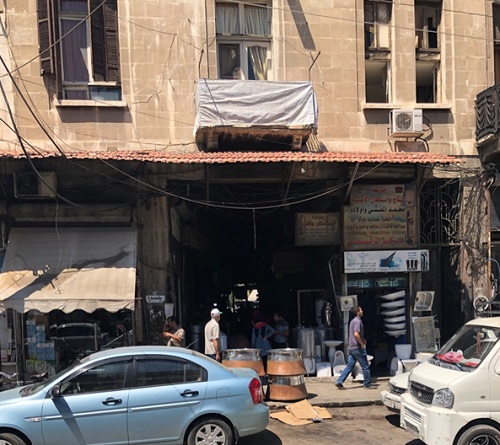Nahasin Souq (Coppersmith Market) in King Fayssal Street.
 The industry of brass is a Damascene characteristic in Syria and the region. Despite competition from plastic, glass, Aluminum, and stainless-steel kitchen tools and housewares, there are still coppersmith workshops
The industry of brass is a Damascene characteristic in Syria and the region. Despite competition from plastic, glass, Aluminum, and stainless-steel kitchen tools and housewares, there are still coppersmith workshops
The coppersmith’s hammers sounds can be heard from their workshops at the most famous Nahasin Souq (Coppersmith Market) in King Fayssal Street.
Coppersmiths produce various kitchen pots, tools and dishes in addition to inlaid yellow brass swords, daggers, trays, teapots and Arabic coffeepots. The professional handcrafts use silver in their industry to make it look more artistic.
 Ahmed Nassif Fitenah, a 69-year-old Damascene coppersmith is considered today the oldest handcraftman in Nahasin Souq (Coppersmith Market).
Ahmed Nassif Fitenah, a 69-year-old Damascene coppersmith is considered today the oldest handcraftman in Nahasin Souq (Coppersmith Market).
“I started learning brass and copper work at the age of 12 from my late father who started work in this Souq in 1930. I started with brass cutting and hammering and later with inlaid silver,” Ahmed Nassif Fitenah said to Syria Times.
 “A Few decades ago, we were producing all kitchen tools and house wares from brass such as brass spoons, forks, knives, glasses, teapots, coffeepots, trays, pans, dishes, pots and everything. In the 1970’s Aluminum and the 1980’s stainless-steel made kitchen tools badly affected the brass industry and enforced hundreds of craftsmen to change their traditional coppersmith work,” he added with a sad face.
“A Few decades ago, we were producing all kitchen tools and house wares from brass such as brass spoons, forks, knives, glasses, teapots, coffeepots, trays, pans, dishes, pots and everything. In the 1970’s Aluminum and the 1980’s stainless-steel made kitchen tools badly affected the brass industry and enforced hundreds of craftsmen to change their traditional coppersmith work,” he added with a sad face.
“The Coppersmith Market was established in the Ottoman period. There were about 500 workshops but today there are only five to six professional handcrafts,” he said.
Radwan al-Nouri is the last copper-bleacher still working in the Souq.
 During hot summer days, Radwan bleaches old brass housewares and pots and removes the old rusty poisonous layer from them.
During hot summer days, Radwan bleaches old brass housewares and pots and removes the old rusty poisonous layer from them.

 A professional coppersmith teaches his young handcrafts how to deal with brass and hammering.
A professional coppersmith teaches his young handcrafts how to deal with brass and hammering.





 “Before the 2011 crisis in Syria, there were big numbers of Saudi, Gulf and European tourists and buyers who were coming to the Souq. They were looking for Syrian made brass products but nowadays only Lebanese and Iraqi tourists come. There are some Jordanians,” a shopkeeper said.
“Before the 2011 crisis in Syria, there were big numbers of Saudi, Gulf and European tourists and buyers who were coming to the Souq. They were looking for Syrian made brass products but nowadays only Lebanese and Iraqi tourists come. There are some Jordanians,” a shopkeeper said.
“The war on Syria affected our business and work badly”,
Report and Photos by Obaida Hamad

